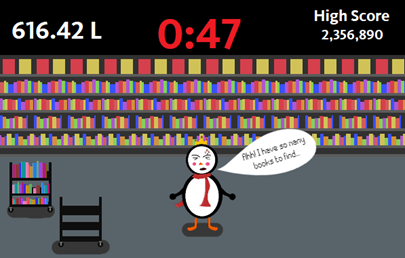Applying Game Design to Libraries

Imagine this- you’re sitting at the reference desk, doing your librarian duties, when a patron asks you for help with something on the computer. You go along with it, thinking they want help resetting their forgotten email password, or how to print a PDF. But no, they’re making a video game and their reference question is this: “How do I make my character dance? That is just one possible future application of Game Design in libraries.
There are many ways Game Design can be applied to libraries. For one providing, for free, the technical help needed to make a video game is something we can do. Personally speaking, I have friendly professors to go to if I run into issues; our patrons are most likely learning all of this on their own via Linkedin Learning through their library card. Sure, they can go to Reddit, the help is there if needed on the internet, but with a librarian, you get that in-person, friendly help.
What a librarian does is tell you the correct information you need to know at the level of skill you are at. On the internet, you can get conflicting information. Another way Game Design can be applied to libraries is through training programs. Below is the concept art of an idea I had for a game (please excuse my art style, I am clearly not the best artist out there). You are on a timer, and you are scored based on how many books you can find within the time limit. (The quicker you find the books, you get the time and a chance to higher your score.) The catch is that you must know either Dewey or LC to find the books, as that is how we librarians find our books.
 Even if nobody is interested in this game, it still has applications for training library pages. You can use it as an on-boarding tool, to teach new staff members how to shelve/find books. With this in mind, there are many other applications of game design that can be used to train new staff members, or even give refreshers. In fact, developing the game itself can be a program offering, in one week we go over how collisions work, and the second we discuss animation.
Even if nobody is interested in this game, it still has applications for training library pages. You can use it as an on-boarding tool, to teach new staff members how to shelve/find books. With this in mind, there are many other applications of game design that can be used to train new staff members, or even give refreshers. In fact, developing the game itself can be a program offering, in one week we go over how collisions work, and the second we discuss animation.
You can adapt books into video games. In the age of digitization, the lending periods of e-books can be quite costly to libraries. By adapting books into their own video games, you can preserve the lesson but just in a new format and to a new audience. You’ll get gamers who borrow both the book and the game, similar to “Now on Netflix” book displays. A lot of YA Sci-Fi can easily be adapted into captivating RPGs such as Final Fantasy. Horror novels may find a new life if you add fixed camera angles like Resident Evil. How gameplay can evolve or make a story better is something to be explored.
Not interested in making video games? Well, on the research side, it is probable that more and more students will make video games their project-based theses in the future. For video games that take place in different parts of history, the developers may need historical documents/research to make sure their game is historically accurate. It’s no different than any researcher or scholar asking for materials for their book, but you will be helping someone who is approaching the assignment as “how do I make this fun for players?”
Tags: gamingatthelibrary, teachinggamingatthelibrary, usinggamingatthelibrary







